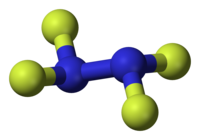Tetrafluorohydrazine
 |
|
 |
|
| Names | |
|---|---|
|
IUPAC name
1,1,2,2-tetrafluorohydrazine
|
|
| Other names
dinitrogen tetrafluoride, perfluorohydrazine, UN 1955
|
|
| Identifiers | |
|
3D model (Jmol)
|
|
| ChemSpider | |
| ECHA InfoCard | 100.030.091 |
|
PubChem CID
|
|
|
|
|
|
| Properties | |
| N2F4 | |
| Molar mass | 104.01 g mol−1 |
| Melting point | −164.5 °C (−264.1 °F; 108.6 K) |
| Boiling point | −73 °C (−99 °F; 200 K) |
|
Except where otherwise noted, data are given for materials in their standard state (at 25 °C [77 °F], 100 kPa).
|
|
|
|
|
| Infobox references | |
Tetrafluorohydrazine or dinitrogen tetrafluoride, N2F4, is a colourless, reactive inorganic gas. It is a fluorinated analog of hydrazine. It is a highly hazardous chemical that explodes in the presence of organic materials.
Tetrafluorohydrazine is manufactured from nitrogen trifluoride using an iron catalyst or iron(II) fluoride. It is used in some chemical syntheses, as a precursor or a catalyst.
Tetrafluorohydrazine was considered for used as a high-energy liquid oxidizer in some never-flown rocket fuel formulas in 1959.
...
Wikipedia
